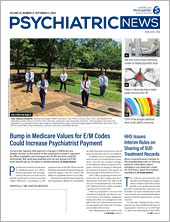The federal government last month issued temporary regulations to make it easier for certain health care professionals who provide treatment for substance use disorders to share information with other health care professionals about patients who have given prior, written consent.
For decades, sharing of that information has been difficult because of regulations—known as 42 CFR Part 2—that were formulated in the 1970s, long before the development of integrated care models that rely on sharing of information. The regulations pertain to substance use treatment professionals (known as “Part 2 providers”) who work in federally supported treatment centers or receive other forms of federal support for substance use treatment. 42 CFR Part 2 does not apply to records created by health care professionals who are not receiving federal support (non-Part 2 providers).
In March, Congress approved more comprehensive changes to 42 CFR Part 2 as part of the Coronavirus Aid, Relief, and Economic Security (CARES) Act, but those changes await the creation of federal regulations to guide their implementation. The changes are intended to help advance coordination of care for patients under the care of multiple health care professionals by aligning 42 CFR Part 2 regulations with those of the Health Insurance Portability and Accountability Act (HIPAA).
In the meantime, the Department of Health and Human Services issued a final rule on August 14 with “interim and transitional” standards that do the following:
•
Allow Part 2 providers, with patient consent, to share patient information orally with a non-Part 2 provider (such as a primary care physician). The non-Part 2 provider may then include the information in a patient’s record that is governed by HIPAA guidelines.
•
Allow opioid treatment providers (OTPs)—with patient consent and assuming it is consistent with state law—to include methadone information in a state Prescription Drug Monitoring Program.
The comprehensive changes legislated in the March CARES Act will further align 42 CFR Part 2 with HIPAA in the following ways:
•
Once prior, written consent from a patient is obtained, the patient’s treatment information may be disclosed by a Part 2 entity or business associate for purposes of treatment, payment, and operations as permitted by HIPAA.
•
Information may be redisclosed pursuant to HIPAA regulations.
•
Records regarding substance use treatment may not be disclosed in criminal, civil, or administrative investigations or proceedings, except when authorized by court order or patient consent.
•
Anti-discrimination protections are expanded under the 42 CFR Part 2 regulations to prevent discrimination against patients with substance use disorders.
The changes enacted in the CARES Act are the result of vigorous advocacy by APA and other affiliated groups in the Partnership to Amend 42 CFR. As stated on the partnership’s website, the outdated 42 CFR Part 2 regulations “set requirements limiting the use and disclosure of patients’ substance use records from certain substance use treatment programs and run counter to new, innovative delivery models that rely on providers’ ability to share health information to effectively and safely coordinate high-quality treatments patients need.”
APA CEO and Medical Director Saul Levin, M.D., M.P.A., said, “These changes will make it easier for patients with substance use disorders to benefit from evidence-based and integrated care models, improving their care.” ■
A webinar about the interim regulations and other changes to 42 CFR Part 2 is archived on the
APA website.
